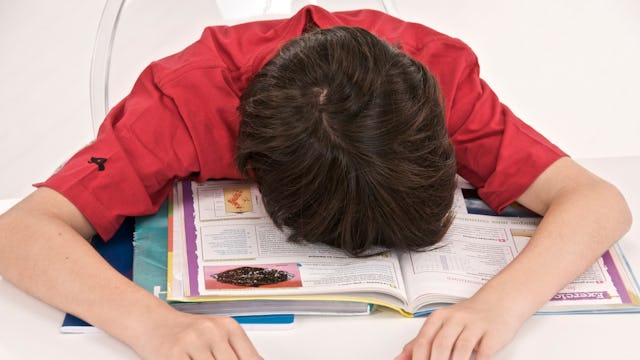It's Official -- Later School Start Time Pays Off For Teens

Just 34 extra minutes is showing major benefits for students
School start times have long been at the center of a heated debate. While elementary schools often start later, many middle and high schools start at the crack of dawn, leaving teens with prolonged sleep deprivation. Multiple studies cite this as the primary cause for a whole host of problems, and it seems finally at least one city listened — and the results speak for themselves.
For the 2016-17 school year, districts in Seattle, Washington moved their official start times for middle and high schools almost an hour later, from 7:50 a.m. to 8:45 a.m. Sounds easy, right? But this meant reshuffling buses, after school activities, and teacher’s schedules, to name a few concerns. All of this effort was meant to give kids the much needed extra time in the morning to sleep.
Researchers at the University of Washington studied these students both before and after the time change and their findings were published this week in the journal Science Advances. Their conclusion? Students got 34 minutes more sleep on average with the delayed start time, which increased their nightly sleep from an average of six hours and 50 minutes to seven hours and 24 minutes — and it had a noticeable effect.
Senior author Horacio de la Iglesia says, “This study shows a significant improvement in the sleep duration of students, all by delaying school start times so they’re more in line with the natural wake-up times of adolescents.”
Yes, even an extra half-hour of sleep is shown to benefit teens. According to the study, this increased sleep time was associated with a 4.5 percent increase in the median grades of the students and an improvement in overall punctuality and attendance. They also showed later school start times were associated “with a better alignment of sleep timing with the circadian system (reduced social jet lag), reduced sleepiness, and increased academic performance.”
Some may say, “Just make your kid go to bed earlier,” to which I say, “It seems you don’t actually own a teenager.” Even if parents were able to persuade their teens to get into bed, many after-school activities (and their own natural circadian rhythms) prevent this. My 13-year-old plays hockey and because his team is older, they don’t get ice time for practices until later. This means he doesn’t get home until after 10:30pm and his bus picks him up at 6:50am. Add in homework, 17 meals (because, 13-year-old boy), and downtime, and it’s almost an impossibility for him to get the sleep he requires.
The American Academy of Pediatrics strongly supports the efforts of school districts like those in Seattle, urging high schools and middle schools to “aim for start times that allow students the opportunity to achieve optimal levels of sleep (8.5–9.5 hours) and to improve physical (eg, reduced obesity risk) and mental (eg, lower rates of depression) health, safety (eg, drowsy driving crashes), academic performance, and quality of life.” But many schools still believe the effort it would take to handle all the moving parts it would create isn’t worth it.
Some may also assume that if teens have a later start time, they’ll just stay up later, but researchers found that wasn’t the case. Bedtimes for these students stayed relatively consistent with previous years and the new start time gave them a more natural time to rise. “We’ve put them in between a rock and a hard place where their biology to go to bed later fights with societal expectations,” says lead researcher Gideon Dunster.
Senior author Horacio de la Iglesia agreed: “Thirty-four minutes of extra sleep each night is a huge impact to see from a single intervention.”
Hopefully, other school districts will look to Seattle’s example and see about snagging a few more Z’s for their own students.
This article was originally published on